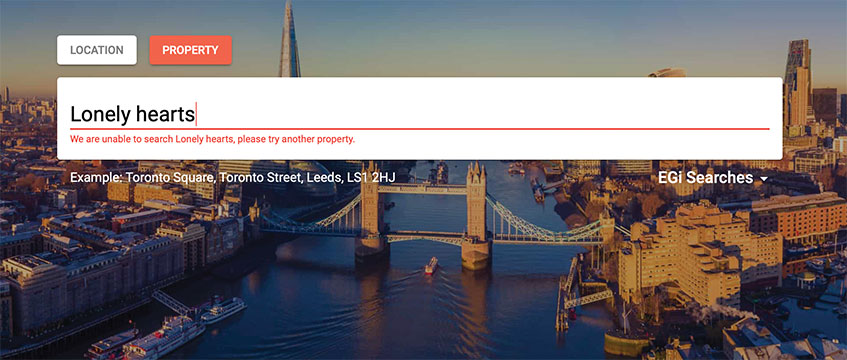If Diary is anything, Diary is fair – even if we are sometimes just a little sharp of tongue. So as, on these pages, we have on numerous occasions taken a cheeky look at some of the industry’s rebrandings, it is only fair that we hold the mirror up to ourselves.
Last week you will have noticed a change to EG. A fresh new logo and – after officially dropping most of the letters of Estates Gazette several years ago – the removal of all references to the old name across our platforms (what’s a gazette, anyway?). If you still want to call us that, it’s fine, we will answer. Diary still can’t call Opal Fruits “Starburst”, so we understand. But, we digress. So far, we’ve not had any Abrdn-style tweets about the new brand, but one user took the opportunity to highlight how the previous Radius “circles” logo on browser tabs looked strangely similar to the Tinder logo. When questioned about why said user had both a contributory database and online dating app open side-by-side on his laptop, he mumbled something about research. Hmmm. All’s fair in love, data and logos. But EG’s fresh new look means that this chap – and anyone else wanting to upload vital statistics to either Radius or Tinder – need no longer fear confusion or disappointment that no-one is swiping right on your 30,000 sq ft office deal in Kettering.
Laying it on the line
It’s that time of year again: the Local Government Association’s unbuilt homes report and the subsequent developer backlash. The LGA’s analysis states 2.78m homes have been granted permission over the past decade, with 1.63m built during the same period – deducing that 1.15m “are yet to be built despite being given the green light”. Cue outrage. “The LGA have published their annual, misleading report about an apparently huge stock of unbuilt permissions proving there’s no problem with the planning system,” says Paul Smith, managing director of Strategic Land Group, arguing the issue is far more complex. Even more scathing Blackstock founder Andrew Teacher claimed the report is “designed to use half-truths to further the rift between developers and planners”. Teacher points to phasing, infrastructure needs and conditions set by councils that actually prevent development and scolds calls for CPO powers to take back consented, unbuilt land. “The LGA’s proposed fixes for the Queen’s Speech are more ridiculous than its claims,” he says, with a particularly ominous outlook for the future: “Like Line of Duty, this has no happy ending.” Maybe the elusive H was Housing all along…
The Pret Index
Bloomberg impressed us this week with a novel approach to tracking the office revival – what it calls the Pret Index. Using data from Pret A Manger, they’re offering a weekly update on sandwich and coffee sales to provide “a real-time gauge of the UK’s recovery”. Genius. In a “geographical cluster” including the City and Canary Wharf, the latest figures show Pret sales at 39% of the pre-Covid level – back when the chain “typically sold about 200,000 lattes and 100,000 croissants a week” across Britain. The picture varies across the country, though, with the London suburbs as high as 86% – and Yorkshire registering an incredible 99% of pre-Covid levels, apparently thanks to customers in Leeds and York “emerging from lockdown with higher savings”. They’re reet ready to eat indeed.
The table doesn’t lie
In the week that the last football stadium Diary visited in person went up for sale (Gigg Lane, of sadly departed Bury FC), highlighting the plight of those at the bottom of the pyramid, developer StripeHomes has been in touch with a little light relief at the expense of the game’s leading lights. After the whole European Super League debacle, Diary welcomes anything that sticks it to the so-called “big six”, so how about if the Premier League table was redrawn based on housebuilding prowess in teams’ surrounding areas? Well, disappointingly, nothing changes at the very top, as the champions elect, Manchester City, still take the prize with net additional dwellings of 4,005 in their local authority area in 2019/20. Joining them in the Champions League places, though, are Aston Villa, West Ham and Leeds United. West Bromwich Albion still go down, this time alongside Southampton and, in last place, Burnley, with a miserable return of 165 additional homes. The biggest movers, hovering just above the drop zone, are Manchester United, courtesy of their Trafford location – though some might argue they should get to claim almost all of the houses built in the South…
Decks and the city
With physical retail and hospitality struggling post-lockdown, there may be an unlikely saviour riding to the rescue. This week, independent record store Rough Trade suggested the vinyl revival might just be the answer. The chain’s New York shop is set to move from Williamsburg, Brooklyn, across the East River to the Rockefeller Center. And it didn’t hold back in trumpeting the significance of the move. “Following the impact of Covid-19, Rough Trade’s decision to relocate reflects a wider reimagination of cities worldwide,” says co-owner Stephen Godfroy. “The opportunities afforded by the pandemic in the reconfiguration of central city districts have brought us, counter-intuitively, to the heart of New York, an area barren of record stores for years.” We’ve known for a long time how DJs save lives (thank you Indeep), but Diary didn’t realise record sales could potentially save cities.











